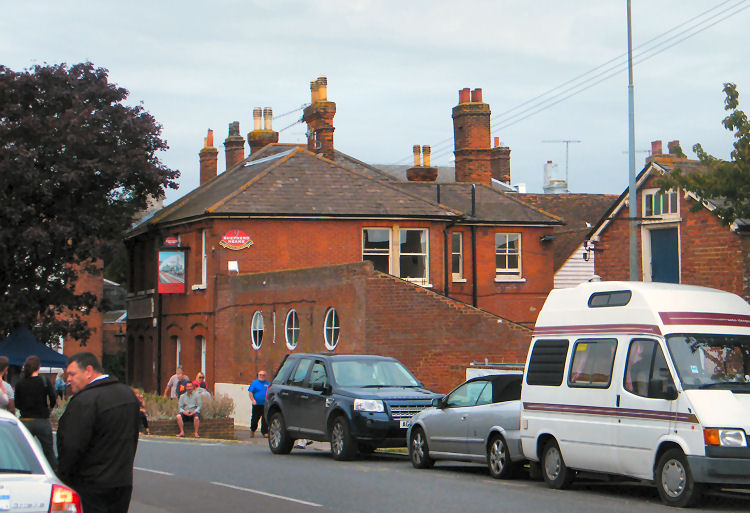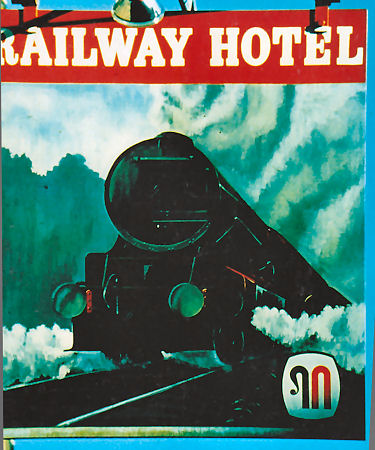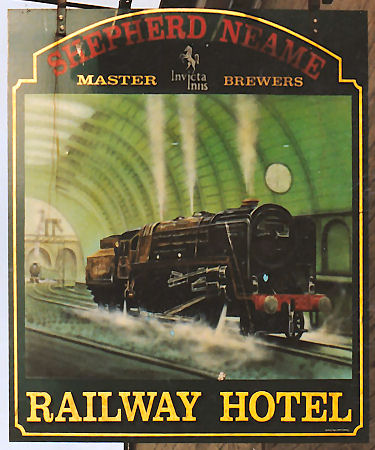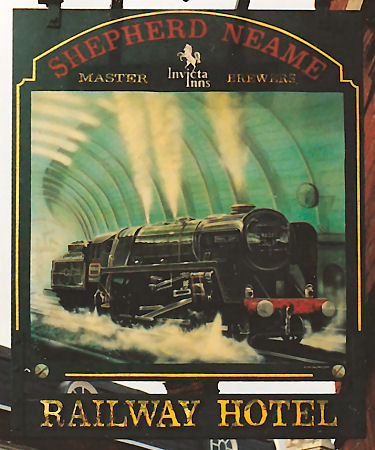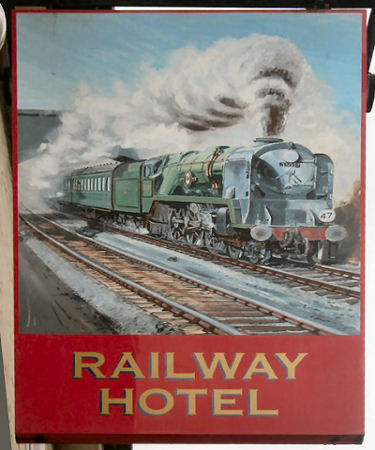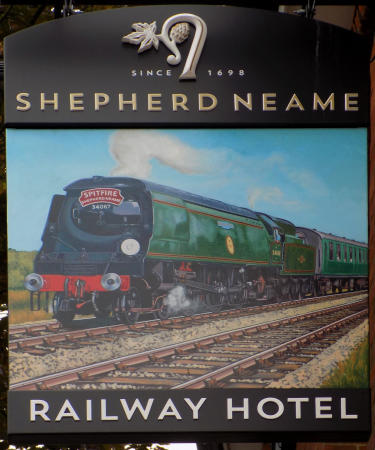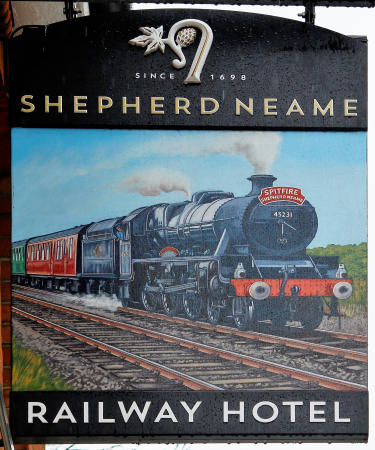|
43 Preston Street
Faversham
01775 533173
https://www.railwayhotelfaversham.co.uk/
https://whatpub.com/railway-hotel
The pub with this name is believed to have existed at the time the
railways were being built in the area and so the year 1858 can be traced.
However, there may well have been another building supplying alcoholic
beverages on the site before this one.
|
From the Kentish Chronicle, 23 July, 1864.
A MAN DROWNED IN FAVERSHAM CHEEK.
On Monday evening an inquest was held at the “Guildhall,” Faversham,
touching the death of a young man named Charles Bourne, about 20 years of
age, a mariner, whose body was found in the Creek at an early hour the
same morning. The jury having viewed the body, the following evidence was
adduced:—
Stephen Hall, mariner, deposed that on the previous night he was in the
company of the deceased, at the “Railway Tavern.” They left that house at
nine o’clock, and proceeded to the “Recreation Tavern,” where they stayed
half an hour. They again left together, and witness parted with the
deceased at the top of Partidge-lane, when he (witness) went towards his
home, in Alley-street, and the deceased said he was going on board the
barge in which he lived. The deceased was the worse for drink, but he
could stand and walk. He (deceased) did not complain of any illness, nor
had he had any disagreement with any one.
Eliza Towers deposed that at four o'clock that morning she was going to
work, and when passing along the side of the Creek, opposite to Mr.
Burtter's wharf, she saw the body of the deceased lying in the mud. There
was a barge there, and the body was close to it. There were some men on
the other side of the wharf, to whom she called, and told what she had
seen. The men then got the body out. She saw the deceased at six o'clock
on Sunday evening, and spoke to him. He was then quite sober, and appeared
to be in his usual health.
John Tester, labourer, deposed that at five minutes past four he was on
board a barge, when his attention was called by the last witness to the
body of the deceased in the Creek. He called the assistance of some other
men, who got the body out, and conveyed it to the stable where it had been
viewed by the jury. It was high water about eleven on Sunday night.
Witness believed the deceased had been on board the barge (as his boots
were untied), and that he had fallen over the opposite side.
Mr. W. N. Spong, surgeon, said he was called to sea the body of the
deceased shortly before five o'clock that morning, and found it in a
stable on the Quay. He examined it externally, and found no fracture or
dislocation of any limb. There was, however, a wound upon the left cheek,
which was recent, because a portion of the skin was attached to it. He
therefore considered the wound was received either during the fall or
immediately before it. He found food in the mouth. He also examined the
thorax and abdomen, but there were no marks of violence there, and there
was no suspicion, as far as he could see, of foul play. He was, therefore,
of opinion that death was caused by drowning.
The Coroner then summed up, remarking that there was no evidence to show
how the deceased came in the Creek, but still there was not much doubt
about it.
One of the jurors remarked upon the careless manner in which the body had
been placed in the stable, and said it would be painful for any of the
friends of the deceased to see it in such a position. It had occurred to
himself and to others of the jury that the body might have been placed
upon some clean straw.
The Coroner said that might have been done, but the law was that all
bodies should remain in the positions in which they were found, as far as
possible, until after the inquest had been held.
The jury then returned a unanimous verdict “Found drowned.”
|
|
From the Whitstable Times, 10 September, 1870.
FAVERSHAM. THE SUICIDE BY WILLIAM JAMES NUTT.
On Friday evening, T. T. Delasaux, Esq., County Coroner, and a respectable
jury, of whom Mr. H. Kirby was chosen foreman, held an inquest at the
“Railway Hotel,” on the body of William James Nutt, who had committed
suicide by poisoning himself.
George Sinden deposed:— Last evening about a quarter to seven o'clock, I
had occasion to go into Mr. T. Terry’s stable, and there saw the deceased
lying on some straw. He was quite dead. I had known him for the last two
years, but had not been in the habit of being in his company. I last saw
him alive on Sunday. I do not know where he has been living of late, but I
have known him to sleep in the stable. I cannot speak as to his state of
mind.
Mr. Patrick James Norris, surgeon, who is at present managing Dr. Gange’s
practice, said:— Last evening I attended at Mr. Terry's Stable and
examined the body of the deceased. He was dead, and I should think he had
been so for six or seven hours. From his appearance I believe he died from
taking a narcotic. The two bottles now produced have recently contained
laudanum.
The Coroner:— But for the bottles being found, should you have been able
to form an opinion as to the cause of death?
Witness:— Not so well; but I might have been led to form an opinion.
By the Foreman:— The bottles having been found I do not think it is
necessary to make a post-mortem examination.
Mr. John Hicks, chemist, in charge of Mr. Wood’s business, deposed:- I
have this day seen the body of the deceased and I identify it as that of a
person who came to the shop between eight and nine o’clock on Wednesday
evening. He had one of his hands wrapped in a handkerchief. He said he had
a bad hand, and asked for some ointment for it; with which I supplied him.
He then asked for threepenny-worth of laudanum. I asked him what he wanted
it for, and he replied that it was not for himself, but for a person who
was in the habit of taking laudanum. I supplied him with half-an-ounce in
one of the bottles produced. It is not at all an unusual thing for a
person to ask for half-an-ounce of laudanum. Two drams would destroy life.
Mr. Frederick William Underdown, chemist, Market-place, said:— The
deceased came to my shop on Wednesday evening and asked for four drams of
laudanum. I asked him if he was in the habit of taking laudanum, and he
said “Yes.” I supplied him with the quantity asked for, and labelled the
bottle “Poison,” printed in red ink. I cautioned the deceased, and told
him to be careful how he used it.
William Bailey, brick maker, said:— I have known the deceased about seven
months. I last saw him alive on Wednesday evening. I was in his company
from seven till a quarter to nine. I met him in Preston-Street, and we
went to the “Swan” and had some beer. Another man named Manouch was with
us. When we left the “Swan” deceased went across to Mr. Wood’s shop,
saying he wanted to get something for his hand. When he came out of the
shop he showed me two bottles, and, pointing to his hand, said “This is
the stuff, Bill” We went to the “Limes Hotel,” and the deceased left at a
quarter to nine. He was then rather tipsy. During the evening he talked a
good deal about his wife. He had been living apart from her for some time.
He said he wanted to see her, and get her to make it up, and not seeing
her seemed to prey upon his mind. He has appeared strange during the last
three weeks, and twice he told me he should make off with himself.
Sergeant Bassett deposed to being called to the stable on Wednesday
evening. He found the ointment produced in deceased’s pocket. One of the
bottles produced was lying by his left hand, and the other was under his
person. They were both wrapped in paper. There was also 1s. 1d. in his
pocket.
The Coroner, in summing up, said the jury could have no doubt as to the
cause of death—that the deceased took the contents of the two bottles
found by his body, and that that was the cause of death. The question for
their consideration was whether the evidence of Bailey was sufficient to
justify them in saying the deceased was in a state of insanity; if not,
then their verdict must be felo de see, the consequences of which he need
not explain. For his own part he was easily satisfied on that point,
because he did not believe any man of sound mind would destroy his own
life. However, it was for the jury and not him to decide.
The jury at once returned a verdict “That the deceased destroyed himself
by taking a narcotic while in a state of unsound mind.”
The father of deceased was present, and stated that his son had not been
right since last winter, when he underwent a painful operation.
|
|
Whitstable Times and Herne Bay Herald 29 December 1888.
DEATH. LANE.
On the 16th Dec., at the "Railway Hotel," Faversham, Pearl Elizabeth, the
beloved wife of William Lane, aged 34.
|
|
Canterbury Journal, Kentish Times and Farmers' Gazette 15 October 1910.
RIFLES.
On Thursday, September 29th, the Canterbury troop of the Royal East Kent
Mounted Rifles held their annual shoot at Conyer Range, Teynham, for
prizes presented by the citizens of Canterbury. Brakes met the party at
Faversham station and conveyed them to the range. Owing to the unavoidable
absence of the troop leader (Lieutenant H. H. Dawes), Captain and
Adjutant du Pre very kindly took charge of the competitions. An excellent
lunch was provided on the range, the catering being in the hands of Mr.
Allen, of the "Railway Hotel," Faversham. Twenty two of the troop being
present.
|
|
From the Faversham Times, Saturday 21 January 1939.
LICENSING.
At the Faversham Borough Petty Sessions on Wednesday. Mr. J. R. Wortham, of the "Railway
Hotel," was granted an occasional license at the Institute on February
1st from 6 p.m. to 12.30 for the dinner and dance of the North East
Grocers' Association.
|
|
From the Dover Express, Thursday, 4
July, 2013. 70p.
LANDLORD IS NOW DEACON
A PUB landlord and a music engineer were ordained as curates by the
Archbishop of Canterbury at the weekend.
They were two of six new deacons to be ordained at the Canterbury
Cathedral service on Saturday.
Chris Maclean, 55, a landlord for over 20 years, now serves his curacy
in Walmer after becoming involved with his local church whilst running
The "Railway" Pub in Faversham.
The married father-of-four said: “Leading worship and assisting in
church started some nagging questions - what I refer to as ‘my itch'.
“This resulted, after many months, in my presentation to the diocesan
discernment panel who recommended me for ordination training.”
|
I have just added the pubs of Faversham after a visit to the hop festival
in 2012.
I will be adding further information as time allows, but with my site
getting ever larger, time spent on each pub is being watered down
unfortunately.
LICENSEE LIST
 PILCHER Edward W 1858-62+ (age 60 in 1861
PILCHER Edward W 1858-62+ (age 60 in 1861 ) )

COWLAN William Cowlan 1874+

LANE William D dec'd 1881-Mar/91 (age 33 in 1881 ) )
 
FIELDING George & Fred 1891+ (brothers 39 & 37 in 1891 ) )
FIELDING Grace Mar/1891+
ALLEN Mr 1910+
CHARLESWORTH William Henry 1903

 &
Jobmaster &
Jobmaster
ALLEN Mrs Esther 1913+

TURNBULL Helen Marjorie (nee CLANCY) pre 1944

 MACLEAN Chris 2006-16+
MACLEAN Chris 2006-16+
HATCHARD Mal to Jan 2014

https://pubwiki.co.uk/RailwayHotel.shtml
 From the Post Office Directory 1862 From the Post Office Directory 1862
 From the Post Office Directory 1874 From the Post Office Directory 1874
 Census Census
 From the Post Office Directory 1882 From the Post Office Directory 1882
 Swinock's Faversham Directory 1888 Swinock's Faversham Directory 1888
 From the Kelly's Directory 1903 From the Kelly's Directory 1903
 From the Kelly's Directory 1913 From the Kelly's Directory 1913
|
